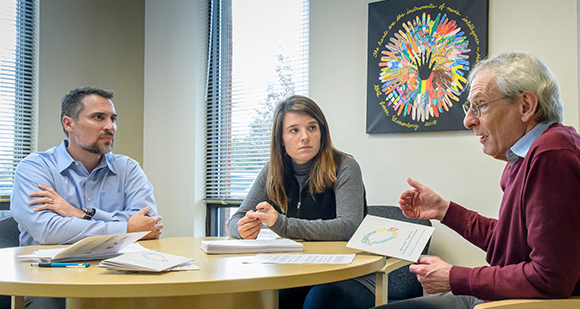How do we express true gratitude?
For those who celebrate the holiday season with gift-giving, it’s a timely question, and UNCG Professor of Human Development and Family Studies Dr. Jonathan Tudge believes he knows the answer.
Tudge’s line of research is the development of gratitude and the decline of materialism in children and adolescents. The Developing Gratitude Research Group consists of two collaborative efforts – one at UNCG and the other in Brazil at the Institute of Psychology at the Universidade Federal do Rio Grande do Sul.
Although many scholars who study gratitude view it as a positive emotion, Tudge said he treats it as a virtue – being grateful to those who have benefited us in some way (and a desire to reciprocate if possible) rather than being appreciative for the nice things that happen to us.
Tudge calls this “connective gratitude,” with the focus on the person who gave the gift, rather than the gift itself.
“It’s gratitude as building relationships between people, because you want to give back to someone who has given to you.”
Tudge’s findings suggest that connective gratitude is the most sophisticated type in children and adolescents, yet in the United States, where people tend to be more individualistic and self-sufficient, we may be falling short.
It takes time, he said, for kids to understand.
“They get the idea that reciprocation is a good thing, but how do you know what that child would really like? Why did that kid help me? Was it done with expectation of reward? If they haven’t thought about experiences like that, they’re not going to be able to be truly grateful.”
In China, 70 percent of kids expressed connective gratitude when asked what they would do for someone who fulfilled their greatest desire. Children in South Korea, Russia and Turkey were a little lower, but those in the U.S. and Brazil ranked the lowest. Less than 40 percent responded with connective gratitude.
“Here’s the really important thing: You’ve got to think about gratitude in the right way,” Tudge said. “Some confuse gratitude with appreciation.”
It’s not a contract, and it’s not simply about appreciation, he added.
“If I’m virtuously grateful, not only am I happy for what you did for me, I’m really happy I did something for you. It’s a part of one’s character,” Tudge said. “That notion of virtuous happiness is so much more than simple appreciation.”
Tudge and his team are hoping to change the culture of gratitude, teaching children what it means to be truly grateful and how to go beyond just saying “thank you.” They’ve created a booklet in English, Spanish and Portuguese for parents and teachers. Copies went out to Guilford County Schools, and they’re designing a gratitude intervention that will go into effect at Greensboro Montessori School in January 2018.
“I’d rather live in a world where people are helping others. Feeling fine is good, but I want other people to be fine,” Tudge said. “Helping an entire group of people feeling good achieving things together – that’s surely what we should be thinking about.”
Now that researchers know more about gratitude and how it develops, Tudge said he wants to see if he can do something to not just increase how grateful people say they are, but to change peoples’ thinking of what gratitude is.
“And how you can make a difference in other people’s lives when they have helped you.”
